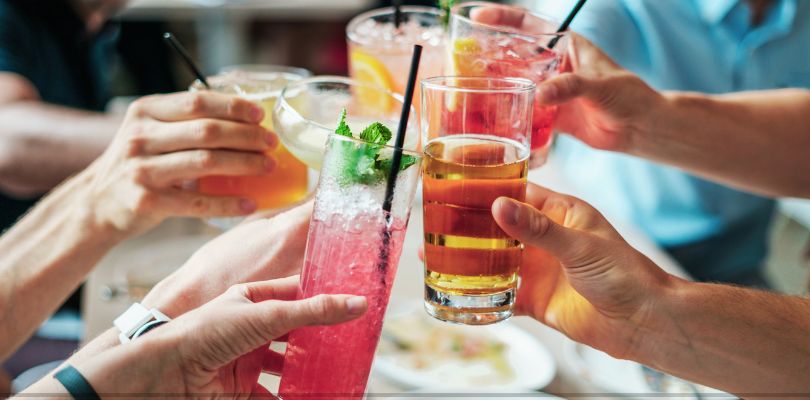What is Eosinophilic Esophagitis?
Eosinophilic esophagitis (EoE) is a chronic immune system disease in which eosinophils, a type of white blood cell, build up in the esophagus. This causes symptoms such as difficulty swallowing, food getting stuck and chest pain. Managing EoE often involves diet changes to reduce triggers that exacerbate symptoms. Certain drinks play a significant role in managing EoE. Let's take a look at drinks to avoid with eosinophilic esophagitis.
Drinks to Avoid with Eosinophilic Esophagitis
1. Citrus Juices (Orange, Lemon, Grapefruit)
Citrus juices are highly acidic, which can irritate the esophagus, particularly in individuals with EoE. The acidity of these juices can exacerbate inflammation and lead to increased discomfort or pain during swallowing. The citric acid in these drinks can contribute to reflux, which makes EoE symptoms worse.
2. Carbonated Beverages (Soda, Sparkling Water)
Carbonated drinks can cause bloating and pressure in the stomach. This can lead to increased reflux which is a common trigger for EoE symptoms. The carbonation can also create a sensation of fullness that may make it more difficult to swallow, aggravating the discomfort experienced by individuals with EoE.
3. Alcoholic Beverages
Alcohol, particularly in beverages like wine, beer and spirits, can irritate the esophagus and increase the production of stomach acid. This can lead to increased acid production and reflux. Additionally, alcohol can relax the lower esophageal sphincter, making it easier for acid to escape from the stomach into the esophagus.
4. Caffeinated Drinks (Coffee, Tea, Energy Drinks)
Caffeine is a common trigger for acid reflux, which can aggravate EoE. It can also relax the lower esophageal sphincter, allowing acid to escape into the esophagus. For those with EoE, this can lead to increased inflammation and more severe symptoms. Furthermore, the acidity in coffee can directly irritate the esophagus.
5. Dairy-Based Beverages (Milk, Milkshakes)
Dairy is a common allergen that can trigger EoE in some individuals. Even if dairy is not a direct allergen, it can still contribute to the production of mucus, which can thicken and cause discomfort in the esophagus. For those with EoE, dairy can lead to an increase in eosinophils in the esophagus, exacerbating the condition.
Yoga for overactive bladder can help symptoms by improving circulation and pelvic strength. Here are the three best poses to try out.
Safe Drinks for People with Eosinophilic Esophagitis
While managing EoE involves avoiding certain beverages, there are still many safe and enjoyable options available.
1. Water
Water is the best drink for people with EoE as it is non-irritating and helps keep the esophagus clear and hydrated. Staying well-hydrated can also help ease the swallowing process and reduce the risk of food getting stuck.
2. Herbal Teas
Herbal teas that are caffeine-free and low in acidity, such as chamomile or ginger tea, can be soothing to the digestive tract. These teas can help calm inflammation and provide relief from symptoms.
3. Almond Milk
Almond milk is a good alternative for those who need to avoid dairy. It is generally well-tolerated by individuals with EoE and can be used in place of cow's milk in beverages.
4. Smoothies (Non-Citrus, Dairy-Free)
Smoothies made with non-citrus fruits and dairy-free milk alternatives can be a nutritious and safe option. Adding ingredients like bananas, blueberries and spinach can provide a nutrient boost without triggering EoE symptoms.
Treatment Options for Eosinophilic Esophagitis
In addition to dietary management, several treatment options are available for EoE. They aim to reduce inflammation and control symptoms. These treatments can vary depending on the severity of the condition and individual patient needs.
- Biologics: Biologic therapies are a newer option for treating EoE and are particularly useful for patients who do not respond well to traditional treatments. Biologics, such as dupilumab, target specific components of the immune system that contribute to the inflammation seen in EoE. These medications are typically administered through injections and have shown promise in reducing both symptoms and the number of eosinophils in the esophagus.
- Proton pump inhibitors (PPIs): PPIs are commonly prescribed to reduce the amount of acid produced by the stomach. While originally used to treat acid reflux, they have been found to help some patients with EoE by reducing esophageal inflammation.
- Topical steroids: Topical corticosteroids, such as fluticasone or budesonide, are often used to treat EoE. These medications are swallowed rather than inhaled (as they typically would be for asthma), allowing them to coat the esophagus and reduce inflammation directly. They can be very effective in controlling symptoms and healing the esophagus.
- Elimination diets: As EoE is often triggered by food allergens, elimination diets are commonly used to identify and remove foods that contribute to inflammation. This approach involves removing common allergens such as dairy, wheat, eggs, soy, nuts and seafood from the diet and reintroducing them one at a time under medical supervision.
- Dilation: For patients with severe esophageal narrowing (strictures), esophageal dilation may be necessary. This procedure involves stretching the esophagus to improve swallowing. While it does not treat the underlying inflammation, it can provide relief from the mechanical difficulties caused by strictures.







